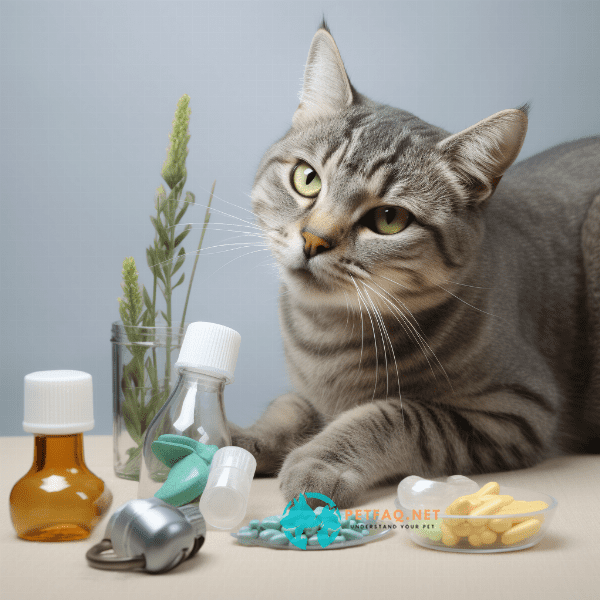Table of Contents
- Understanding Cat Teeth Tartar: Causes and Consequences
- Brushing Your Cat’s Teeth: Step-by-Step Guide
- Alternatives to Brushing: Dental Treats, Toys, and Supplements
- The Role of Diet in Preventing Cat Teeth Tartar
- Regular Vet Check-Ups: Importance and Frequency
- Professional Teeth Cleaning for Cats: When is it Necessary?
- Common Mistakes to Avoid When Taking Care of Your Cat’s Teeth
- Signs of Dental Problems in Cats: What to Watch For
- Preventing Other Dental Issues: Gum Disease, Tooth Decay, and More
Understanding Cat Teeth Tartar: Causes and Consequences
Cat teeth tartar is a common dental problem that can lead to a host of health issues if left untreated. Tartar is the hard, yellowish-brown substance that accumulates on the teeth when plaque is not removed regularly. In this section, we’ll discuss the causes and consequences of cat teeth tartar in more detail.
Causes of Cat Teeth Tartar
There are several factors that contribute to the development of cat teeth tartar. One of the primary causes is poor oral hygiene. When cats don’t have their teeth brushed regularly, plaque builds up on the teeth, which can eventually harden into tartar. Tartar can also form as a result of a diet high in carbohydrates or from certain health conditions, such as kidney disease or diabetes.
Consequences of Cat Teeth Tartar
If left untreated, cat teeth tartar can lead to a number of health problems. One of the most common consequences is periodontal disease, a serious infection that can damage the gums and bones that support the teeth. This can lead to tooth loss and even infections that can spread to other parts of the body. In addition, the bacteria that thrive in the tartar can enter the bloodstream and cause problems with the heart, liver, and kidneys.
To prevent these serious health issues, it’s important to take steps to prevent and treat cat teeth tartar. Regular brushing, a healthy diet, and routine dental check-ups are all important components of a comprehensive dental care plan for your feline friend.
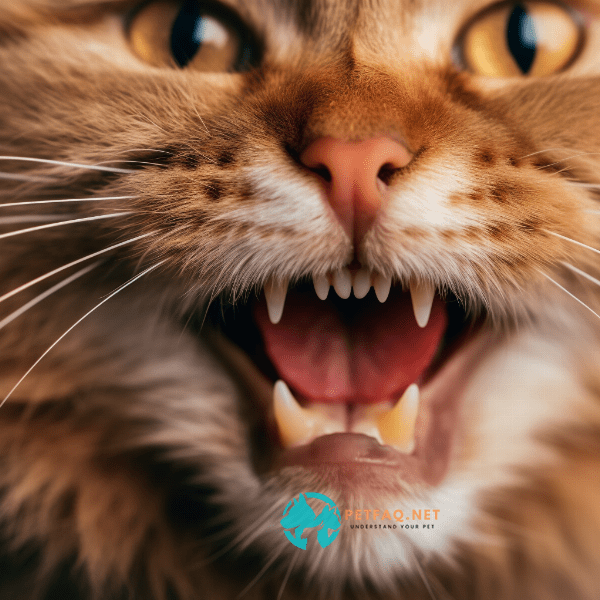
Brushing Your Cat’s Teeth: Step-by-Step Guide
Brushing your cat’s teeth regularly is one of the best ways to prevent cat teeth tartar and maintain good dental health. While it may seem like a daunting task, with the right tools and technique, brushing your cat’s teeth can be a stress-free experience for both you and your furry friend. Here’s a step-by-step guide to help you get started.
Step 1: Choose the Right Toothbrush and Toothpaste
To begin, you’ll need to select a toothbrush and toothpaste that are specifically designed for cats. Avoid using human toothpaste, which can be toxic to cats. Toothbrushes designed for cats are typically smaller and softer than those designed for humans, making them easier to use on your cat’s delicate teeth and gums.
Step 2: Get Your Cat Used to the Brush
Before you start brushing, let your cat sniff and taste the toothpaste. This will help them get used to the taste and texture. Once they’re comfortable with the toothpaste, start introducing the toothbrush. Let your cat sniff and lick the brush, and give them plenty of praise and treats to reinforce positive behavior.
Step 3: Begin Brushing
Once your cat is comfortable with the toothbrush, you can start brushing their teeth. Hold the brush at a 45-degree angle to the teeth and use gentle, circular motions to brush the teeth and gums. Focus on the outside surfaces of the teeth, as this is where cat teeth tartar tends to accumulate. Be sure to avoid brushing too hard, as this can irritate the gums and cause discomfort.
Step 4: Reward Your Cat
When you’re finished brushing, give your cat plenty of praise and a special treat. This will help reinforce positive behavior and make the experience more enjoyable for your cat. With regular brushing, you can help prevent cat teeth tartar and keep your cat’s teeth and gums healthy for years to come.
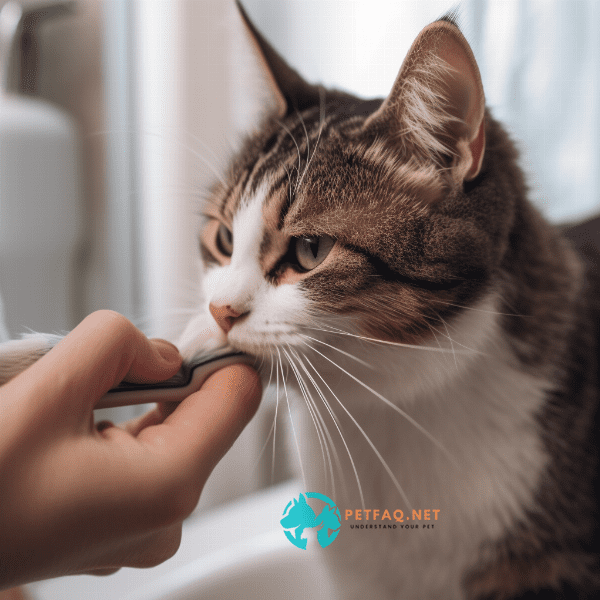
Alternatives to Brushing: Dental Treats, Toys, and Supplements
While brushing your cat’s teeth is the most effective way to prevent cat teeth tartar, it’s not always easy or feasible. Luckily, there are several alternative methods that can help keep your cat’s teeth and gums healthy. Here are some options to consider.
Dental Treats and Chews
Dental treats and chews are a convenient and tasty way to help prevent cat teeth tartar. These treats are designed to be chewed, which helps scrape plaque and tartar off the teeth. Some dental treats also contain ingredients that help freshen breath and promote healthy gums. Look for treats that are specifically designed for dental health, and avoid those that are high in sugar or calories.
Dental Toys
Another option is to use dental toys to help keep your cat’s teeth clean. Toys that are specifically designed for dental health, such as those with ridges and grooves, can help scrape plaque and tartar off the teeth while your cat chews and plays. Look for toys that are made from safe and durable materials, and be sure to supervise your cat while they’re playing.
Supplements
There are also supplements available that can help promote healthy teeth and gums. These supplements typically contain ingredients like enzymes and probiotics that can help break down plaque and tartar and reduce inflammation in the mouth. While supplements can be effective, they should be used in conjunction with other dental care practices, such as brushing and regular check-ups.
By incorporating these alternative methods into your cat’s dental care routine, you can help prevent cat teeth tartar and maintain good dental health. Remember, it’s important to consult with your veterinarian before introducing any new supplements or treats to your cat’s diet.
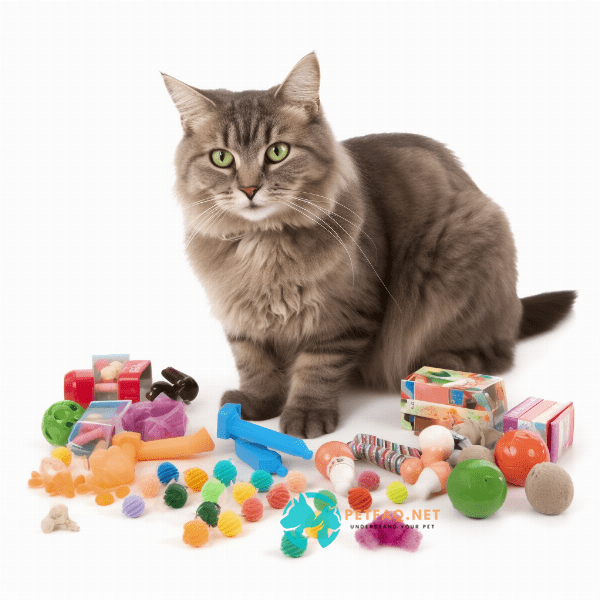
The Role of Diet in Preventing Cat Teeth Tartar
A cat’s diet plays an important role in their overall health, including their dental health. By feeding your cat a balanced and nutritious diet, you can help prevent cat teeth tartar and keep their teeth and gums healthy. Here’s what you need to know.
Wet vs. Dry Food
One factor to consider when choosing your cat’s food is whether to feed them wet or dry food. While both can be nutritious, wet food tends to be better for dental health. Wet food contains more moisture than dry food, which helps promote saliva production and flushes away bacteria and food particles from the mouth. In addition, the chewing action required to eat dry food can actually contribute to the development of cat teeth tartar.
High-Quality Ingredients
Another important factor is the quality of the ingredients in your cat’s food. Look for food that is made from high-quality, natural ingredients and is free from fillers and by-products. Foods that are high in protein and low in carbohydrates can also help promote good dental health, as they are less likely to contribute to the development of plaque and tartar.
Dental-Specific Diets
By feeding your cat a healthy and balanced diet, you can help prevent cat teeth tartar and promote good dental health. Be sure to consult with your veterinarian to determine the best diet for your cat’s specific needs.
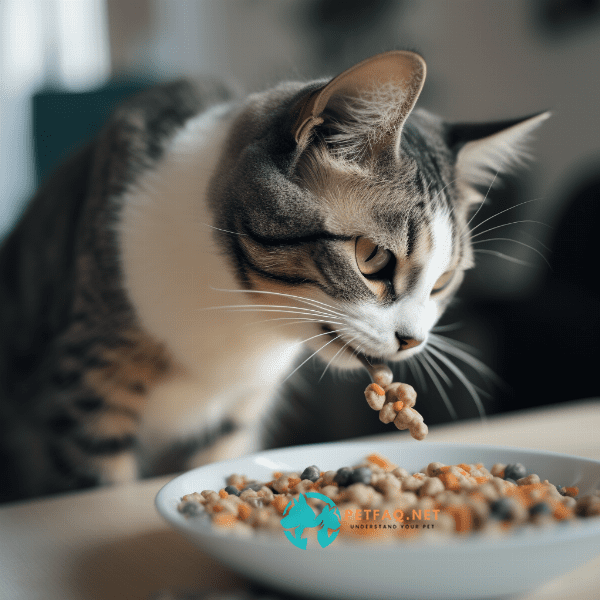
Regular Vet Check-Ups: Importance and Frequency
In addition to regular brushing and a healthy diet, regular vet check-ups are an essential component of your cat’s dental care plan. Regular check-ups can help detect and prevent cat teeth tartar, as well as other dental issues, before they become more serious. Here’s what you need to know.
Importance of Regular Check-Ups
Regular check-ups with your veterinarian are important for several reasons. First, they allow your vet to examine your cat’s teeth and gums and check for signs of dental issues, such as cat teeth tartar, gum disease, or tooth decay. Second, your vet can provide professional cleaning and scaling services to remove any plaque and tartar that has built up on your cat’s teeth. Finally, regular check-ups can help detect other health issues that may be impacting your cat’s dental health, such as kidney disease or diabetes.
Frequency of Check-Ups
The frequency of your cat’s check-ups will depend on their age, overall health, and any dental issues they may have. In general, most cats should have a dental check-up at least once a year, while older cats or those with existing dental issues may require more frequent check-ups. Your veterinarian can help determine the best schedule for your cat’s needs.
At-Home Care Between Check-Ups
While regular check-ups are important, at-home dental care is also crucial for preventing cat teeth tartar and other dental issues. Brushing your cat’s teeth regularly, feeding them a healthy diet, and providing dental treats and toys can all help keep their teeth and gums healthy between check-ups.
By combining regular vet check-ups with at-home dental care practices, you can help prevent cat teeth tartar and ensure that your feline friend enjoys good dental health throughout their life.
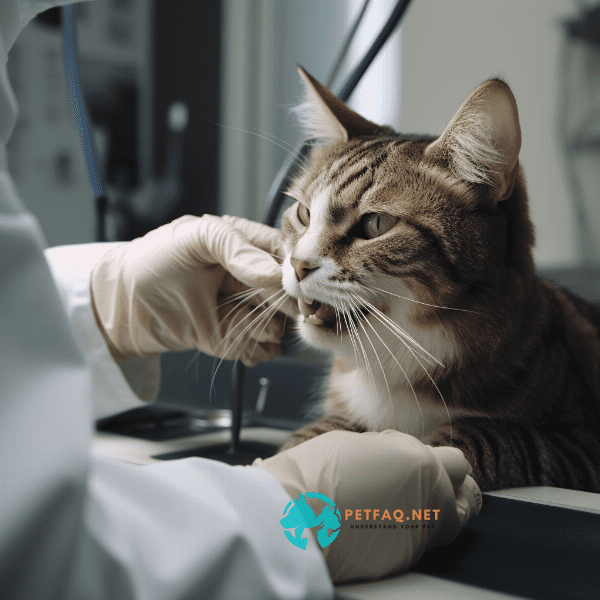
Professional Teeth Cleaning for Cats: When is it Necessary?
While regular brushing and check-ups can help prevent cat teeth tartar, there may be times when professional teeth cleaning is necessary. Professional teeth cleaning involves a thorough cleaning and scaling of your cat’s teeth, and is typically performed under general anesthesia. Here’s what you need to know.
Signs Your Cat May Need Professional Teeth Cleaning
There are several signs that may indicate your cat needs professional teeth cleaning. One of the most common is the presence of cat teeth tartar, which can be visible as yellow or brown buildup on the teeth. Other signs may include bad breath, swollen or bleeding gums, loose teeth, or difficulty eating or chewing.
Benefits of Professional Teeth Cleaning
Professional teeth cleaning can provide several benefits for your cat’s dental health. First and foremost, it can help remove cat teeth tartar and plaque that has built up on the teeth, which can help prevent gum disease and tooth decay. In addition, professional teeth cleaning can also help detect and treat other dental issues, such as fractured teeth or infections. Finally, a clean and healthy mouth can improve your cat’s overall health and well-being.
When to Schedule Professional Teeth Cleaning
By staying alert to the signs of cat teeth tartar and other dental issues, and scheduling regular professional teeth cleanings when necessary, you can help keep your cat’s teeth and gums healthy and prevent more serious health issues from developing.
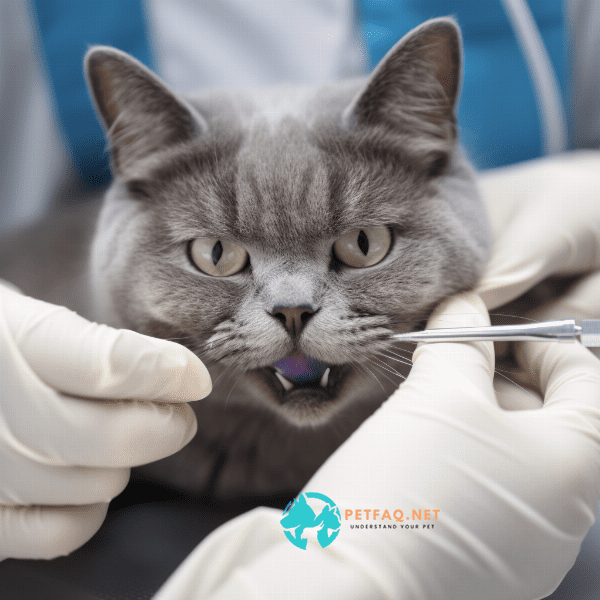
Common Mistakes to Avoid When Taking Care of Your Cat’s Teeth
Taking care of your cat’s teeth is essential for their overall health and well-being. While there are several effective methods for preventing cat teeth tartar and other dental issues, there are also some common mistakes that pet owners should avoid. Here are some things to keep in mind.
Mistake 1: Using Human Toothpaste
One common mistake is using human toothpaste to brush your cat’s teeth. Human toothpaste contains ingredients that can be toxic to cats and can cause stomach upset, vomiting, and other health issues. Instead, use toothpaste that is specifically designed for cats.
Mistake 2: Not Brushing Often Enough
Another mistake is not brushing your cat’s teeth often enough. Brushing should ideally be done daily, as plaque and cat teeth tartar can quickly accumulate on the teeth if left unchecked. If you’re having trouble brushing your cat’s teeth, try incorporating dental treats and toys into their routine, or consult with your veterinarian for other alternatives.
Mistake 3: Not Seeking Professional Care When Necessary
Finally, it’s important to seek professional dental care for your cat when necessary. This includes regular check-ups and cleanings, as well as treatment for any dental issues that may arise. Delaying professional care can lead to more serious health issues down the road, so it’s important to address any concerns as soon as possible.
By avoiding these common mistakes and staying on top of your cat’s dental care, you can help prevent cat teeth tartar and other dental issues and ensure that your feline friend enjoys good dental health for years to come.
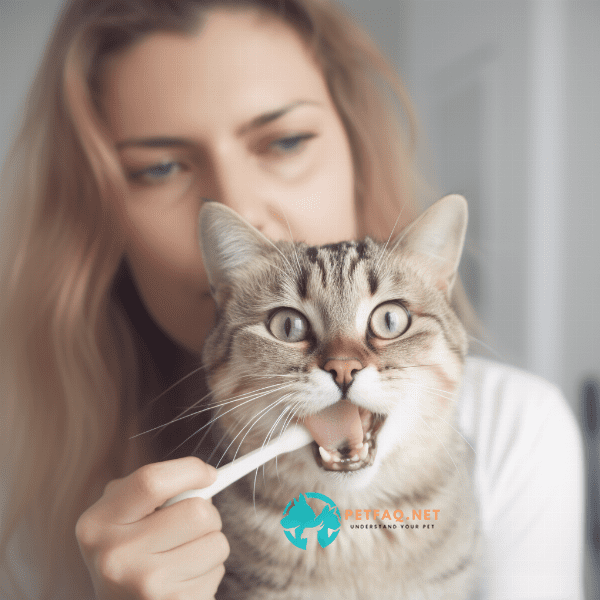
Signs of Dental Problems in Cats: What to Watch For
It’s important to be aware of the signs of dental problems in cats, as these issues can have a significant impact on your cat’s overall health and well-being. Here are some common signs to watch for.
Bad Breath
One of the most common signs of dental problems in cats is bad breath. While some mild odor is normal, persistent bad breath can be a sign of cat teeth tartar, gum disease, or other dental issues.
Difficulty Eating or Chewing
Another sign of dental problems in cats is difficulty eating or chewing. Cats with dental issues may avoid certain types of food, or may have trouble eating altogether. This can lead to weight loss and other health issues.
Swollen or Bleeding Gums
Swollen or bleeding gums are another common sign of dental problems in cats. These symptoms can indicate gum disease or infection, both of which can cause pain and discomfort.
Yellow or Brown Buildup on Teeth
Visible yellow or brown buildup on the teeth is a clear sign of cat teeth tartar. If left untreated, this buildup can lead to more serious dental issues and even tooth loss.
Behavioral Changes
Finally, changes in behavior can also be a sign of dental problems in cats. Cats with dental issues may become more irritable or withdrawn, or may avoid certain activities that they once enjoyed.
By staying alert to these signs and seeking professional dental care when necessary, you can help prevent cat teeth tartar and other dental issues and ensure that your cat enjoys good dental health throughout their life.
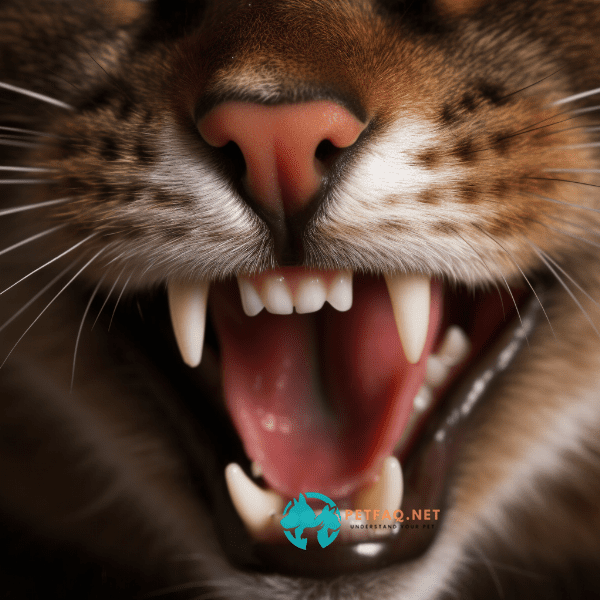
Preventing Other Dental Issues: Gum Disease, Tooth Decay, and More
In addition to preventing cat teeth tartar, there are several other dental issues that pet owners should be aware of. Here are some tips for preventing common dental issues in cats.
Gum Disease
Gum disease is a common dental issue in cats, and can be caused by a buildup of plaque and cat teeth tartar on the teeth. To prevent gum disease, it’s important to brush your cat’s teeth regularly and provide them with a healthy diet. Professional dental cleanings can also help remove any plaque or tartar that has built up on the teeth.
Tooth Decay
Tooth decay is another common dental issue in cats. This can be caused by a variety of factors, including a poor diet, a lack of dental care, and genetics. To prevent tooth decay, it’s important to provide your cat with a balanced and nutritious diet, and to brush their teeth regularly. In addition, be sure to schedule regular check-ups with your veterinarian to catch any issues early.
Oral Tumors
Oral tumors can also be a serious dental issue in cats. While not all oral tumors are cancerous, they can cause pain and discomfort and can interfere with eating and other activities. To prevent oral tumors, it’s important to keep up with your cat’s regular check-ups and to seek veterinary care if you notice any unusual lumps or growths in their mouth.
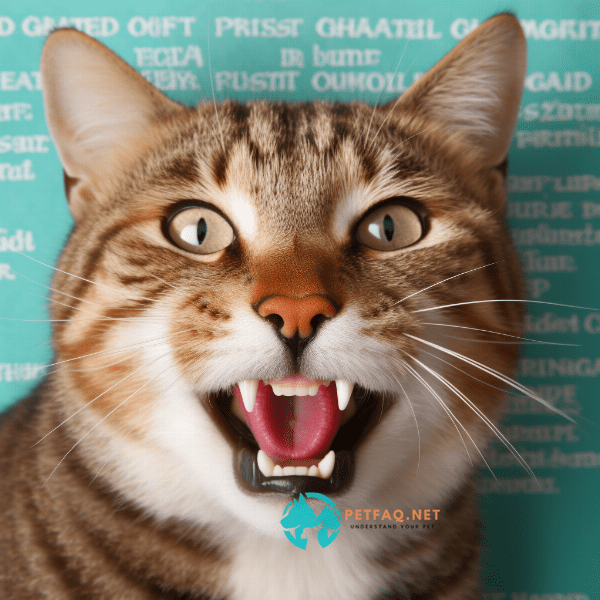
Frequently Asked Questions (FAQs) about cat teeth tartar:
1. Can tartar on a cat's teeth cause health problems?2. Can cat teeth tartar be prevented?
3. How often should I clean my cat's teeth to prevent tartar buildup?
4. How can I prevent tartar buildup on my cat's teeth?
5. How long does it take for tartar to form on a cat's teeth?

